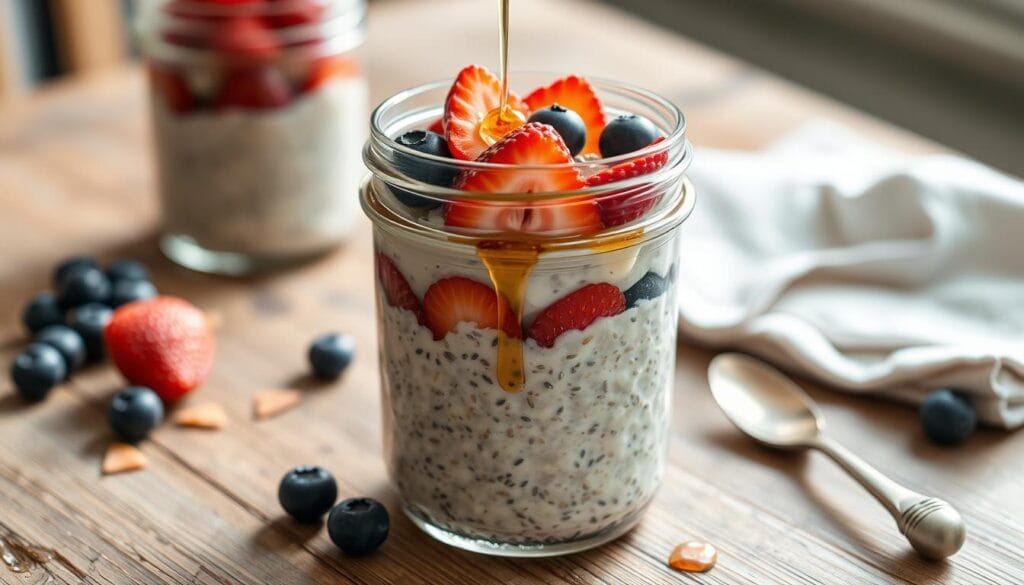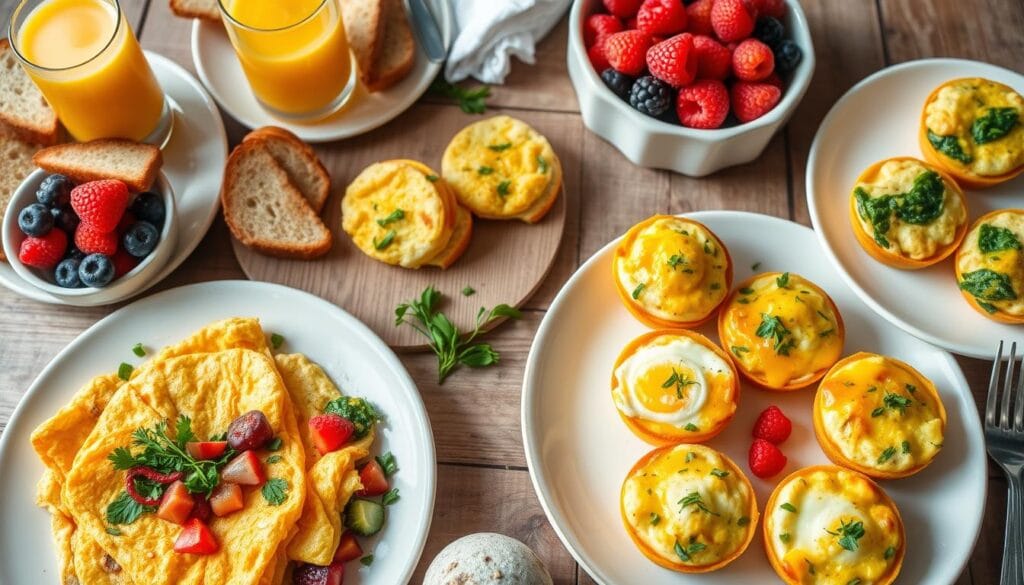Gluten free breakfast diet life style can be tough. Finding tasty and healthy breakfasts is a big challenge. But today, I’m excited to share 10 gluten-free breakfast ideas that will make you look forward to mornings.
These recipes are perfect for anyone with celiac disease or just trying gluten-free living. You’ll find everything from fluffy waffles to savory burritos. They’re packed with healthy fats, fiber, and protein to keep you full and energized all day.
Table of Contents
Understanding Gluten-Free Diets
Starting a gluten-free lifestyle can feel both freeing and tough. Gluten, found in wheat, barley, and rye, causes many stomach problems. For those with celiac disease or gluten sensitivity, it can make them feel much better.
What is Gluten?
Gluten is a protein in grains like wheat, barley, and rye. It makes baked goods soft and chewy. But for people with celiac disease or gluten sensitivity, it can cause serious health issues.
Benefits of Going Gluten-Free
Going gluten-free can really help your health. It can reduce inflammation, improve digestion, and boost energy. It also helps avoid nutritional gaps common in celiac disease.
Common Gluten Sources
Being gluten-free means being careful where gluten hides. It’s in:
- Breads, pasta, and baked goods made with wheat, barley, or rye
- Cereals, crackers, and processed snacks
- Sauces, dressings, and condiments thickened with flour
- Certain beverages, such as beer and some types of wine
- Some supplements and medications
Knowing where gluten is and checking labels helps keep your diet safe. This way, you can enjoy celiac diet, wheat-free meals, and allergy-friendly cooking.
“Transitioning to a gluten and dairy-free diet requires planning and access to creative recipes.”
Tasty Gluten-Free Pancakes
Start your day with a stack of delicious, gluten-free pancakes. They are incredibly flavorful and versatile. You can customize them to fit your dietary needs.
Ingredients You’ll Need
- 1 cup of gluten-free flour blend
- 2 tablespoons of granulated sugar
- 1 1/2 teaspoons of baking powder
- 1/2 teaspoon of salt
- 3/4 cup of milk (dairy or non-dairy)
- 1 large egg
- 2 tablespoons of oil or melted butter
- 1/2 teaspoon of vanilla extract
Preparation Steps
Making these gluten-free pancakes is easy. Whisk together the dry ingredients in a large bowl. Then, add the wet ingredients and stir until smooth.
Let the batter rest for about 5 minutes. This helps it reach the perfect consistency.
Preheat a lightly oiled or buttered griddle or skillet over medium heat. Scoop about 1/4 cup of batter onto the hot surface. Cook for 3 minutes per side, or until golden brown. Repeat with the remaining batter, keeping the cooked pancakes warm in a 225°F oven until ready to serve.
Topping Suggestions
The possibilities for toppings are endless! Drizzle with pure maple syrup, sprinkle with fresh berries, or top with creamy Greek yogurt. For a decadent treat, try a sprinkle of chopped nuts, a sprinkle of cinnamon, or a generous helping of chocolate chips.
Gluten-free and dairy-free pancakes are a fantastic option for a wholesome and satisfying breakfast. With a few simple tweaks, you can enjoy these thick, light, and fluffy pancakes while catering to your dietary needs. Experiment with different mix-ins and toppings to find your perfect gluten-free breakfast combination.
Wholesome Smoothie Bowls
Looking for a nutritious and customizable gluten-free breakfast option? Smoothie bowls are perfect. Blend fruits, non-dairy milk, and protein for a delicious start.
Base Ingredients
The smoothie bowl starts with a blended mix. Use frozen fruits like bananas or berries with non-dairy milk. Add nut butters or protein powder for extra protein.
Toppings and Mix-Ins
- Fresh fruit slices (e.g., strawberries, kiwi, bananas)
- Crunchy toppings like nuts, seeds, granola, or coconut flakes
- Drizzles of honey, maple syrup, or nut butters
- Superfoods like chia seeds, hemp hearts, or goji berries
Nutritional Benefits
Smoothie bowls are tasty and nutritious. They mix fruits, veggies, and proteins for fiber, vitamins, and minerals. You can adjust them to fit your diet, whether dairy-free or not.
Be creative with your smoothie bowl. It will energize your morning and keep you full all day.
Savory Breakfast Burritos
Start your day with a delicious gluten-free breakfast burrito. These wraps are filled with nourishing ingredients and packed with flavor. Choose from classic egg and vegetable or sausage and beans for a hearty option. They’re perfect for a quick, energizing breakfast.
Gluten-Free Tortillas
The key to a great gluten-free breakfast burrito is the tortilla. Look for ones made from rice flour, tapioca starch, or corn. These tortillas are sturdy yet flexible, holding your filling without issues.
Filling Ideas
- Scrambled eggs with sautéed vegetables like bell peppers, onions, and spinach
- Seasoned ground breakfast sausage or chorizo
- Creamy avocado and fresh cilantro
- Black beans or refried beans for added protein and fiber
- Shredded cheese, such as cheddar or Monterey Jack
Cooking Instructions
- Prepare the filling ingredients according to your preferences, such as scrambling eggs or sautéing vegetables.
- Warm the gluten-free tortillas to make them pliable and easy to roll.
- Distribute the filling evenly down the center of each tortilla.
- Fold the sides of the tortilla over the filling, then roll tightly to create a burrito.
- For a make-ahead option, wrap the burritos individually and freeze for up to 3 months. Reheat in the microwave or oven when ready to enjoy.
Enjoy your savory gluten-free breakfast burritos as a quick and satisfying start to your day. With a variety of filling options, you can customize these wraps to suit your taste preferences and dietary needs.
Flavorful Overnight Oats
Overnight oats are a tasty and easy gluten-free breakfast. You can make them in many ways to match your taste. They’re perfect for a quick and delicious morning.
Base Recipe
To make the base, you need a few things:
- 1 cup certified gluten-free rolled oats
- 1 3/4 cups non-dairy milk (like almond, soy, or oat milk)
- 1 tablespoon chia seeds or ground flaxseeds
- 1-2 tablespoons maple syrup or honey (or your sweetener)
- 1/2 teaspoon vanilla extract
- Pinch of salt
Just mix all the ingredients in a Mason jar or container. Stir well and chill for 4 hours or overnight. They’ll soak up the liquid and become creamy.
Add-in Ideas
Overnight oats are fun because you can add lots of things. Start with the base and then try different mix-ins:
- Fresh or frozen berries (like blueberries, raspberries, or blackberries)
- Diced apples, pears, or bananas
- Cinnamon, nutmeg, or other warm spices
- Peanut butter, almond butter, or other nut butters
- Chopped nuts, seeds, or granola for crunch
- Shredded coconut or cocoa powder for a treat
Variations to Try
Once you know the base, try new flavors:
- Blueberry Overnight Oats: Add 1/2 cup of fresh or frozen blueberries and a bit of cinnamon.
- Peanut Butter and Banana Overnight Oats: Mix in 2 tablespoons of peanut butter and mash 1/2 a banana.
- Tropical Overnight Oats: Add diced pineapple, shredded coconut, and a bit of lime juice.
With so many options, you can make a new gluten-free breakfast every day. Enjoy your tasty overnight oats and start your day right!

Greek Yogurt Parfaits
Start your day with a protein-packed punch by indulging in delectable Greek yogurt parfaits. These allergy-friendly breakfast creations are not only delicious but also incredibly nutritious. They are the perfect choice for those seeking a dairy-free and gluten-free morning meal.
Layering Techniques for Parfait Perfection
Building a well-balanced parfait is an art form. Begin by spooning a layer of creamy dairy-free Greek yogurt into a glass or jar. Next, top it off with a generous helping of crunchy, gluten-free granola. Finally, crown your creation with a vibrant array of fresh, juicy fruits.
Fruit and Nut Combos for Added Flavor
- Rhubarb and Ginger: A tangy-sweet pairing that adds a delightful zing to your parfait.
- Tropical Delight: Pineapple, mango, and coconut flakes for a taste of the tropics.
- Berry Bliss: Raspberries, blueberries, and blackberries for a antioxidant-rich treat.
Sweetening Options for the Perfect Parfait
While Greek yogurt provides a natural sweetness, you can take your parfait to the next level. Drizzle in a touch of honey or maple syrup. For an extra special touch, try incorporating a spoonful of homemade chia seed jam for a burst of fruity flavor without the added sugar.
| Nutritional Information (per serving) | Greek Yogurt Parfait | High Protein Granola |
|---|---|---|
| Calories | 447 | 210 |
| Fat | 11g | 11g |
| Carbohydrates | 66g | 29g |
| Fiber | 8g | 4g |
| Protein | 34g | 9g |
Indulge in the perfect balance of flavors and nutrients with these dairy-free breakfast parfaits. Whether you’re looking for a quick and allergy-friendly cooking option or a delightful weekend treat, these Greek yogurt creations are sure to satisfy your taste buds and fuel your day.
Scrumptious Egg Dishes
Eggs are great for a gluten-free breakfast. You can make a savory frittata, fluffy scrambled eggs, or egg muffins. These are all tasty ways to start your day.
Frittata with Veggies
Begin with a vegetable frittata. Mix eggs, diced bell peppers, spinach, and herbs. Bake it in a skillet or muffin tin for a protein-rich dish.
Scrambled Eggs with Herbs
Scrambled eggs with herbs are easy and delicious. Add chopped basil, chives, or parsley to the eggs. Serve with gluten-free toast or potatoes for a full meal.
Baking Egg Muffins
Egg muffins are perfect for a quick breakfast. Mix eggs, veggies, and gluten-free meat or cheese. Bake in a muffin tin for easy, portable meals.
Adding these egg dishes to your breakfast can make mornings better. You’ll get a nutritious and tasty start to your day.

Classic Avocado Toast
Avocado toast is a favorite for breakfast and brunch. It’s simple yet packed with flavor. It’s also great for those who follow a gluten-free or vegan diet.
Choosing the Right Bread
The base of avocado toast is key. Choose a thick, whole grain or gluten-free bread. This keeps the toast from getting soggy. Options include sourdough, multigrain, or artisanal loaves.
Topping Combinations
Avocado toast is all about variety. Add a poached egg for extra protein. Cherry tomatoes, radishes, and sea salt can also make it better. For creaminess, try feta or mozzarella.
Seasoning Advice
Seasoning makes all the difference. Use black pepper and lemon or lime juice for creaminess. Red pepper flakes or herbs like basil add extra flavor.
Avocado toast is perfect for any meal. It’s a must-have in your gluten-free or vegan recipes.
Homemade Granola
Make your gluten-free breakfast better with homemade granola. This recipe uses gluten-free oats, nuts, seeds, and natural sweeteners. It’s a big hit for your taste buds. You can choose from classic or seasonal flavors to satisfy your cravings.
Easy Recipe for Gluten-Free Granola
To make this tasty granola, you need a few ingredients. You’ll need 4 cups of organic gluten-free oats, 1 cup of nuts and seeds, and 2 tablespoons of flaxseed meal. Add 1 tablespoon of cinnamon and 1 teaspoon of pumpkin pie spice if you like.
For sweetness, use 1/4 cup of coconut oil, 1/4 cup of raw organic honey, and 3 tablespoons of organic pure maple syrup. Don’t forget 2 tablespoons of organic molasses. Finally, add a teaspoon of organic vanilla extract and a whisked large egg white to hold it together.
Gluten-Free Oats and Sweeteners
Using certified gluten-free oats makes your granola safe for those on a gluten-free diet. Natural sweeteners like honey, maple syrup, and molasses give it a rich flavor. You can also add dried fruit, chocolate chips, or coconut flakes to make it your own.
Storage Tips
After baking, store your granola in an airtight container at room temperature for 1 to 2 weeks. Or, freeze it for up to 3 months. This way, you can enjoy your homemade gluten free breakfast whenever you want.
Breakfast Quinoa Bowls
Start your day with a nutritious and tasty gluten-free breakfast – quinoa bowls! Quinoa is an ancient alternative grain that’s packed with protein. It’s versatile and easy to make, perfect for a sweet or savory morning.
Quinoa Cooking Basics
To make the quinoa base, mix it with water or non-dairy milk for a creamy bowl. Use vegetable broth for a savory bowl. Cook until it’s light and fluffy, then fluff it with a fork.
Sweet Versus Savory Bowls
- For a sweet bowl, add fresh fruits, nuts, maple syrup, and cinnamon.
- For a savory bowl, add sautéed veggies, herbs, and a poached egg or avocado.
Flavor Enhancements
Try different spices, nut butters, or Greek yogurt to enhance your quinoa bowl. There are countless ways to make a delicious and healthy gluten-free breakfast.
| Prep Time | Cooking Time | Total Time |
|---|---|---|
| 10 minutes | 15 minutes | 25 minutes |
Make a homemade quinoa breakfast bowl for a healthy start. It’s a great alternative to traditional gluten-free recipes. Enjoy a nutritious and tasty meal that will keep you energized all morning.
Delicious Chia Seed Pudding
Try a vegan breakfast with chia seed pudding. It’s full of nutrients and gluten-free. Mix chia seeds with non-dairy milk, let it sit, and enjoy a creamy breakfast in the morning.
Making Chia Pudding
For great chia pudding, use 2 tablespoons of chia seeds and 1/2 cup of almond milk. Whisk them together and wait 15 minutes for the chia seeds to swell. Then, refrigerate it for 2 hours or overnight for the best taste.
Flavor Variations
- Vanilla Chia Pudding: Add 1/2 teaspoon of vanilla extract for a classic taste.
- Cocoa Chia Pudding: Mix in 1 tablespoon of unsweetened cocoa powder for a chocolatey flavor.
- Fruit Chia Pudding: Blend in 1/4 cup of your favorite fruit puree, like mango or berries.
Serving Ideas
Chia seed pudding is easy to customize. Top it with fresh fruit, nuts, or gluten-free granola for extra texture. It keeps well in the fridge for up to 5 days, making it a great breakfast choice.
| Chia Seed Pudding Recipe | Nutrition Facts (per serving) |
|---|---|
|
|
Chia seeds are full of fiber, protein, and Omega-3s. This pudding is a healthy vegan breakfast or snack. Enjoy it as part of a balanced, gluten-free diet.
Tips for Gluten-Free Breakfasts
Starting with gluten-free cooking can feel overwhelming. But, with the right tips, you can make tasty and healthy gluten-free breakfasts every day. Learn how to shop for the best products and what kitchen tools you need. These tips will help you become a pro at making gluten-free breakfasts.
Shopping for Gluten-Free Products
When you’re shopping for gluten-free ingredients, make sure they’re certified. This ensures your meals are safe from gluten. Get to know gluten-free grains like quinoa and millet. Also, have almond, coconut, and oat flour on hand for baking.
Kitchen Essentials for Preparation
Having the right kitchen tools is key for making great gluten-free breakfasts. Get a good blender for smoothies and chia seed puddings. Also, have a strong set of pots and pans for cooking eggs and pancakes. Don’t forget airtight containers for storing things like overnight oats or homemade granola.
Meal Prep Strategies
Meal prep can save you time in the morning. Make a big batch of gluten-free pancakes or waffles and freeze them. Prepare overnight oats ahead of time, trying out different flavors. Plus, make a lot of homemade granola to enjoy all week, either on its own or on top of yogurt.

